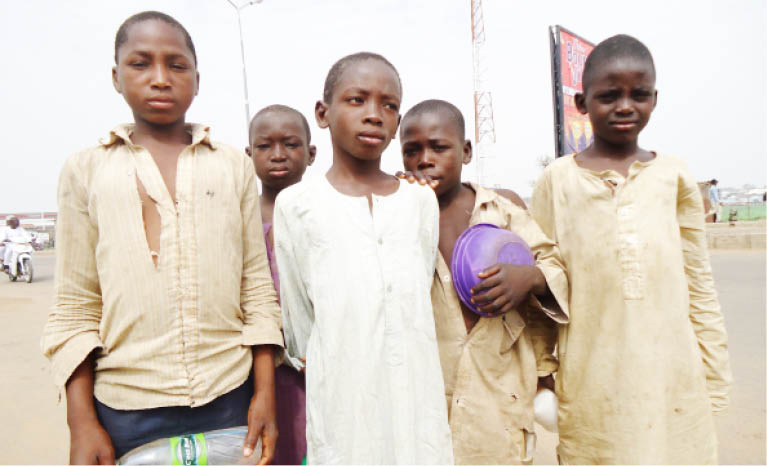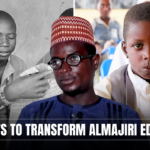Perhaps no topic generates as much heat today than a discussion on the almajiranci system of Islamic education. Though mainly practiced in the northernmost part of the country, its neglect and repercussions of its consequent decline is felt all over the country.
At its heydays it drew adherents from far and wide. Sadly, it had fallen on hard times and degenerated into being linked with street begging and child trafficking and all the associated concomitants.
- Senate wants Almajiri education integrated into formal system
- Fake degrees, almajiri and Nigeria’s underdevelopment
The fact was that almajiranci got stuck in a time-capsule with archaic methods overseen by tutors who were unwilling to change and adapt to more progressive ways of doing things. The result: wholesale depression and poverty for a whole region.
There were efforts to reform the institution and bring it to the level of contemporary practices. Way back in the early 1960s I witnessed efforts by Borno Native Authority to upgrade selected tsangaya schools (the centre piece of almajiranci), by building cemented zaures for them and I guessed also advancing some regular stipends to the Mallams.
You might also guess that other Native Authorities in the region facing the same dilemma were doing the same. A pity that the country was then at the threshold of a prolonged military regime and many factors made continuity difficult and the tsangaya schools were left in doldrums.
More efforts were made at the turn of the millennium when democracy returned to our lives, culminating in the Jonathan’s administration Almajiri schools. They were good structures and well equipped unfortunately due perhaps to disagreements with the state governments the schools were abandoned and left in severe disrepair.
There was still no relenting on the effort to reform and reposition the tsangaya schools. This pandemic era provided fresh impetus and street children many of whom were unfortunately identified with almajirci became nuisance targets for clearance. Many northern state governments made official declarations abolishing almajiranci, as if officialdom could with a wave of hand do away with an entrenched, age old, practice.
Meanwhile there had been many robust private initiatives studying the issues surrounding the institution of almajiranci and seeking for a solution. One of the latest addition was the webinar conducted by the Kaduna-based Gusau Institute. Cashing on the current need for social distancing, the Gusau Institute reached out those stakeholders in the north that had been passionately involved in finding a solution to almajiranci.
The event held on 28th June over a three-hour period with 12 panellists presenting a broad variety of perspectives all of it via zoom. There were over 500 participants all over the world and the programme reached thousands via Radio Nagarta. Mohammed Hayatuddeen, the accomplished banker and economist who now chairs the northern-oriented Renaissance Development Forum (RDF), acted as a moderator.
The panellists include a serving governor, Professor Baba Gana Zulum of Borno State, two emirs, Alh Abubakar Shehu Abubakar of Gombe and Dr Muhammadu Nuhu Sanusi of Dutse, a member of the National Assembly and former Minister of for Education, A’isha Dukku, Abubakar Suleiman, Managing Director of Sterling Bank, three prominent ulamas, Dr Bashir Umar, Dr Farouk Umar, Dr Mujtaba Abubakar Ramadan and Nasir Yahaya Alarramma, a former almajiri.
Three well known advocates of change in the institution of almajiranci presented context for the discussion drawing on their extensive researches. One of the advocates, Dr Bashir Galadanci is a computer and telecom engineering expert, who had been teaching in Bayero University since 1985 and had served in Kano State Government as a special adviser to the Governor and later as commissioner.
His presentation was graphic showing the number, spread and concentration of almajirai. He identified the problems of almajiranci and made wide recommendations and in particular that the educational policy needs to be revised such that, irrespective of which type of school children attend, they have the opportunity to attain higher education in any field they desire.
Dr Hadiza Kere Abdulrahman is an academic and an expert on the almajiranci system having extensively researched the institution. She is a lecturer in Inclusive Education in Bishop Grosseteste University in the United Kingdom. With the benefit of working experience she was able to debunk most of the negativity about almajiranci and suggested broadening the narrative so that more solutions can be added to the thoughtless idea of contemplated banning. She suggests the RER approach to address the problems of almajiranci, where R stands for respect, E for engage and R for reform.
Dr Usman Bugaje is too well known as an activist in the arena to warrant an introduction. Suffice it to add that the Arewa Research and Development Project (ARDP) that he leads has over the years done a lot pioneering work on the subject of uplifting the education sector in the North. ARDP has even gone ahead to establish the Aafaq Foundation and has engaged 50 scholars to focus on curriculum reform and mobilization of the ulama. Dr Bugaje is in close contact with both Dr Bashir and Dr Hadiza to create synergy for their recommendations. He concluded his presentation with a call for a National Summit on Almajiranci.
Readers might imagine the rich and vigorous discussions that followed these ample presentations as well as the questions and answers that followed. On the whole the panellists agreed that banning almajiranci is not even on the cards.
Readers can look forward to the full report online soon.

 Join Daily Trust WhatsApp Community For Quick Access To News and Happenings Around You.
Join Daily Trust WhatsApp Community For Quick Access To News and Happenings Around You.


